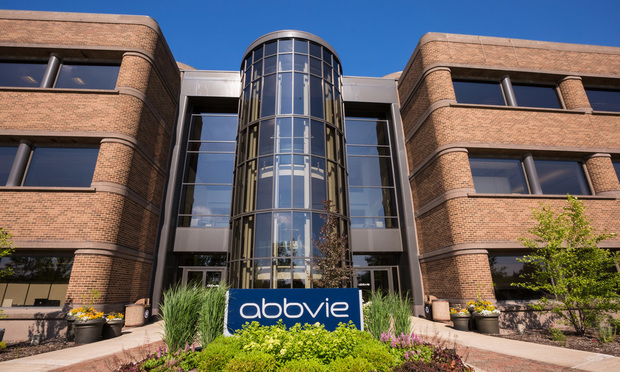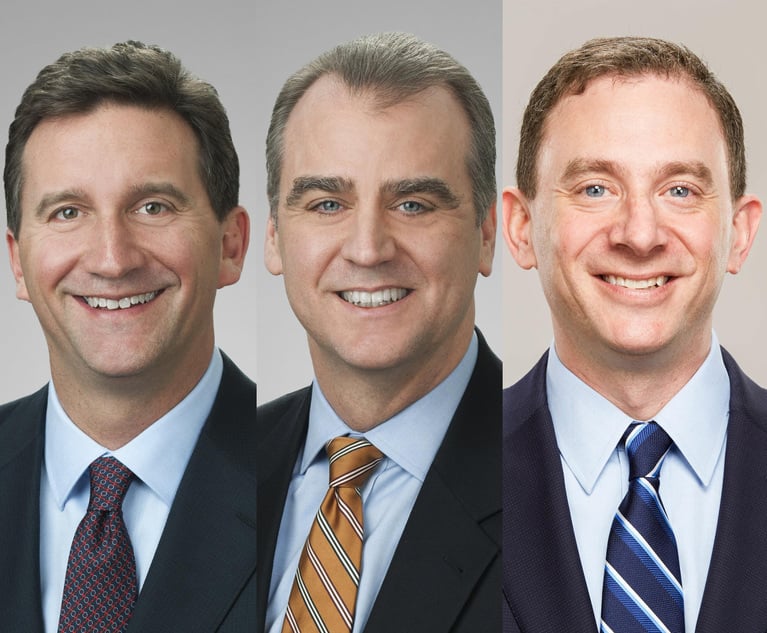Del. Supreme Court Upholds Dismissal in AbbVie Inversion Case
A three-judge panel of the high court Monday upheld, by order, a Chancery Court decision from July that dismissed the suit on demand futility grounds, finding that the directors did not face a substantial risk of liability for their role in scuttling the $55 million deal.
February 19, 2019 at 04:30 PM
4 minute read
 Abbvie
Abbvie
The Delaware Supreme Court has upheld the dismissal of a derivative suit targeting the board of AbbVie Inc. over an aborted buyout of Shire, which ended up costing the Chicago-based drugmaker more than $1.6 billion.
A three-judge panel of the high court Monday upheld, by order, a Chancery Court decision from July that dismissed the suit on demand futility grounds, finding that the directors did not face a substantial risk of liability for their role in scuttling the $55 million deal. The two-sentence order, signed by Justice Karen L. Valihura, affirmed on the basis of the Chancery Court's July 10 ruling and did not detail any independent reasoning from the Supreme Court.
AbbVie investor Kyle Ellis and his Bottini & Bottini attorneys filed the derivative lawsuit in May 2017, accusing the board of releasing false and misleading statements regarding the merger.
Ellis claimed that AbbVie had pushed the deal with its Irish rival as a part of a corporate inversion strategy to significantly cut its tax rate by changing the company's country of residence. However, amid changing guidance from the U.S. Treasury Department, the directors publicly downplayed the importance of the merger's tax benefits, despite those concerns being the primary rationale behind the transaction, Ellis said.
Though legislation eliminating the tax benefits of inversions had been introduced at the time, the general consensus dictated that a gridlocked Congress would fail to enact the proposals, and after monitoring the political developments, AbbVie's directors decided the potential benefits of merging with Shire outweighed the risks.
However, AbbVie withdrew from the deal after the treasury department announced in September 2014 that it planned to unilaterally enact its regulations, triggering the payment of a $1.65 million breakup fee to Shire.
In July, Vice Chancellor Sam Glasscock III dismissed the suit with prejudice. In a 34-page memorandum opinion, Glasscock found that none of the statements cited in the lawsuit were false or misleading and that Ellis had failed to show that the defendants had any involvement in authorizing or ratifying them.
AbbVie's charter also contained a clause exculpating the directors from liability for breaching their duty of care, and there was no evidence, Glasscock said, to support claims that they had acted in bad faith.
“In light of the exculpation clause, it is not enough to allege that the misleading statements occurred on these directors' watch; nor is it enough to plead facts from which I may infer negligence, or even gross negligence, in the directors' failure to cure the misimpression caused by the statements,” Glasscock wrote.
Ellis' attorney, Francis A. Bottini Jr., said he was “disappointed” that Glasscock's decision wasn't reversed on appeal, saying “it was an egregious situation” that led his client to file his complaint. Bottini pointed to a federal class action in Illinois, as well as various cases filed in state court, where similar fraud claims against AbbVie and its directors were allowed to proceed.
“We think this was the wrong decision, but that's the way it goes,” said Bottini, a partner at Bottini & Bottini in La Jolla, California.
“It's another example of Delaware protecting the officers and directors, and screwing the shareholders,” he said.
An attorney for AbbVie's directors did not immediately respond Tuesday to a call seeking comment on the case.
Ellis was represented by Bottini and Albert Y. Chang of Bottini & Bottini. Blake A. Bennett, a director at Cooch and Taylor Attorneys at Law, acted as Delaware counsel.
The directors were represented by Robert J. Kopecky and Joshua Z. Rabinovitz of Kirkland & Ellis in Chicago and Lisa A. Schmidt and Daniel E. Kaprow of Richards, Layton & Finger in Wilmington.
The case was captioned Ellis v. Gonzalez.
This content has been archived. It is available through our partners, LexisNexis® and Bloomberg Law.
To view this content, please continue to their sites.
Not a Lexis Subscriber?
Subscribe Now
Not a Bloomberg Law Subscriber?
Subscribe Now
NOT FOR REPRINT
© 2025 ALM Global, LLC, All Rights Reserved. Request academic re-use from www.copyright.com. All other uses, submit a request to [email protected]. For more information visit Asset & Logo Licensing.
You Might Like
View All
Defending Against a $290M Claim and Scoring a $116M Win in Del. Drug Patent Fight

Wilson Sonsini Knocks Out Claims Against Inhibrx Biosciences in Trade Secrets Verdict


Chancery Again Rules in Plaintiff's Favor in Earnout Provision Dispute
3 minute readTrending Stories
- 1Uber Files RICO Suit Against Plaintiff-Side Firms Alleging Fraudulent Injury Claims
- 2The Law Firm Disrupted: Scrutinizing the Elephant More Than the Mouse
- 3Inherent Diminished Value Damages Unavailable to 3rd-Party Claimants, Court Says
- 4Pa. Defense Firm Sued by Client Over Ex-Eagles Player's $43.5M Med Mal Win
- 5Losses Mount at Morris Manning, but Departing Ex-Chair Stays Bullish About His Old Firm's Future
Who Got The Work
J. Brugh Lower of Gibbons has entered an appearance for industrial equipment supplier Devco Corporation in a pending trademark infringement lawsuit. The suit, accusing the defendant of selling knock-off Graco products, was filed Dec. 18 in New Jersey District Court by Rivkin Radler on behalf of Graco Inc. and Graco Minnesota. The case, assigned to U.S. District Judge Zahid N. Quraishi, is 3:24-cv-11294, Graco Inc. et al v. Devco Corporation.
Who Got The Work
Rebecca Maller-Stein and Kent A. Yalowitz of Arnold & Porter Kaye Scholer have entered their appearances for Hanaco Venture Capital and its executives, Lior Prosor and David Frankel, in a pending securities lawsuit. The action, filed on Dec. 24 in New York Southern District Court by Zell, Aron & Co. on behalf of Goldeneye Advisors, accuses the defendants of negligently and fraudulently managing the plaintiff's $1 million investment. The case, assigned to U.S. District Judge Vernon S. Broderick, is 1:24-cv-09918, Goldeneye Advisors, LLC v. Hanaco Venture Capital, Ltd. et al.
Who Got The Work
Attorneys from A&O Shearman has stepped in as defense counsel for Toronto-Dominion Bank and other defendants in a pending securities class action. The suit, filed Dec. 11 in New York Southern District Court by Bleichmar Fonti & Auld, accuses the defendants of concealing the bank's 'pervasive' deficiencies in regards to its compliance with the Bank Secrecy Act and the quality of its anti-money laundering controls. The case, assigned to U.S. District Judge Arun Subramanian, is 1:24-cv-09445, Gonzalez v. The Toronto-Dominion Bank et al.
Who Got The Work
Crown Castle International, a Pennsylvania company providing shared communications infrastructure, has turned to Luke D. Wolf of Gordon Rees Scully Mansukhani to fend off a pending breach-of-contract lawsuit. The court action, filed Nov. 25 in Michigan Eastern District Court by Hooper Hathaway PC on behalf of The Town Residences LLC, accuses Crown Castle of failing to transfer approximately $30,000 in utility payments from T-Mobile in breach of a roof-top lease and assignment agreement. The case, assigned to U.S. District Judge Susan K. Declercq, is 2:24-cv-13131, The Town Residences LLC v. T-Mobile US, Inc. et al.
Who Got The Work
Wilfred P. Coronato and Daniel M. Schwartz of McCarter & English have stepped in as defense counsel to Electrolux Home Products Inc. in a pending product liability lawsuit. The court action, filed Nov. 26 in New York Eastern District Court by Poulos Lopiccolo PC and Nagel Rice LLP on behalf of David Stern, alleges that the defendant's refrigerators’ drawers and shelving repeatedly break and fall apart within months after purchase. The case, assigned to U.S. District Judge Joan M. Azrack, is 2:24-cv-08204, Stern v. Electrolux Home Products, Inc.
Featured Firms
Law Offices of Gary Martin Hays & Associates, P.C.
(470) 294-1674
Law Offices of Mark E. Salomone
(857) 444-6468
Smith & Hassler
(713) 739-1250






